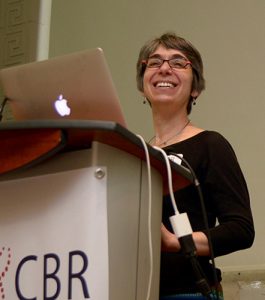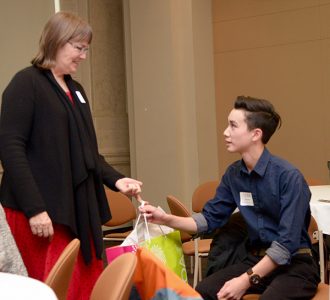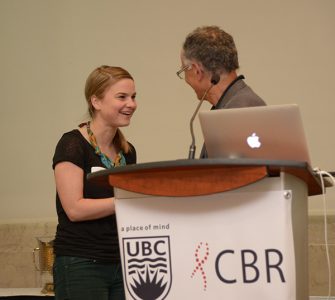 By Tara Fernandez, Houra Loghmani, Shawna Stanwood, and Deb Chen
By Tara Fernandez, Houra Loghmani, Shawna Stanwood, and Deb Chen
The 5th Annual Norman Bethune Symposium, hosted by the Centre for Blood Research, brought together a diverse and dynamic group of researchers, clinicians and students for a day of engaging discussions highlighting the latest in blood research. Held in beautiful downtown Vancouver, the symposium celebrated the persevering efforts of Dr. Bethune in pioneering an innovative mobile blood collection and distribution system in the 1930s.
Watch Norman Bethune Symposium Talks – Now Available Online
See the Photos from Norman Bethune Symposium 2016
This year’s distinguished panel of speakers highlighted today’s challenges and breakthroughs in transfusion medicine. Local and international plenary speakers, invited by Dr. Dana Devine, included Dr. Claudia Cohn, Dr. Christopher Silliman and Dr. Michaël Chasse. The research presented illustrated several current and emerging trends related to blood collection for clinical use. For example, Dr. Michael Busch, from the University of California San Francisco, shared his fascinating work highlighting the potential threats to the donor blood supply by infectious agents such as Zika virus. Dr. Erik Vu also brought to light recent progress in transfusion accessibility by commenting on outpatient blood programs in Vancouver.
While we pride ourselves in our Canadian healthcare system, it appears that numerous challenges to service quality and efficiency still remain. UBC’s Dr. Jason Sutherland explored the specialized roles of scientists, clinicians and the public in maximizing the potential of the health care funding system. He explained that in future, the funding system should provide incentives for health care institutions, physicians, and affiliated home cares to enhance their quality of care towards patients.
Among the highlights of the day was a video documenting the heartbreaking journey taken by 11-year-old Aidan Chin, while battling acute lymphoblastic leukemia. There was an overwhelming outpouring of emotion from the crowd when Aidan then addressed them in person, speaking openly of the trials and tribulations of his diagnosis and therapy. He eloquently described the ongoing struggles associated with being a cancer survivor. Aidan was extremely grateful for the 12 transfusions he received during the course of his treatments. When asked by an audience member about how he felt after receiving donor blood, his eyes lit up, saying “It feels really good, you feel healthy again and it’s like an instant boost of energy!”.
Hearing Aidan share his struggles and victories while battling cancer was the highlight of the day for many symposium attendees. Several attendees commented that it was a powerful reminder to embrace our vulnerability and to be mindful of the real reasons behind our research efforts. Graduate students were also excited to share their work with a broader audience in the form of posters and shotgun presentations. Three CBR PhD candidates, Ahmad Arbaeen (Devine Lab), Rolinda Carter (Pryzdial Lab) and Vivienne Chan (Kastrup Lab) took to the stage to deliver their talks on their research contributions, which were each followed by thought-provoking discussions. The outstanding quality of research from all the CBR students and postdoctoral fellows attracted much interest from researchers in the field and helped expand collaborative networks.
Judges, comprised of postdoctoral fellows and researchers, had the difficult task of choosing a winner for the Best Poster Prize. After much deliberation, Erika Siren an accomplished 3rd year PhD student from the Kizhakkedathu lab in the Department of Chemistry was awarded the coveted prize. Her poster, entitled “Polymer-mediated cell surface engineering against damage and rejection in organ transplantation” drew much interest for the potential to revolutionize transplantation medicine in the future. Erika thanked her supervisor Dr. Kizhakkedathu for his unwavering support and mentioned the possibility of pursuing scientific consulting as a future career path.
Yet another successful symposium was undoubtedly a result of the energy and passion from the attendees, as well as the generosity of sponsors and the many volunteers who worked tirelessly behind the scenes. While enjoying wine and cheese at the end of the day, it was evident that Dr. Bethune’s dedication to improving health care on a universal scale lives on among researchers at the CBR and beyond.





